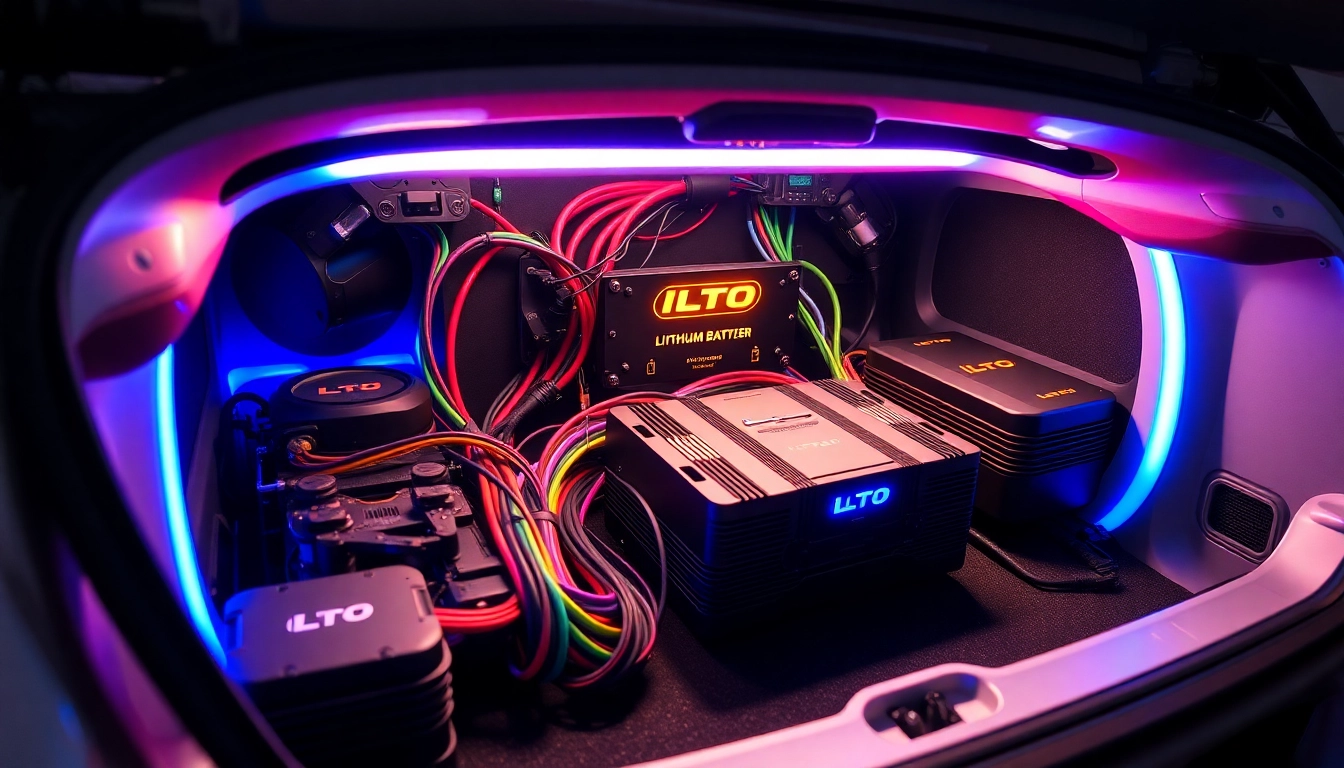
Understanding Car Audio Accessories
What Are Car Audio Accessories?
Car audio accessories are essential components that enhance the listening experience within the vehicle. They can range from simple add-ons that boost audio quality to complex systems that involve multiple devices for achieving the ultimate sound setup. Among these accessories, batteries play a crucial role, providing the necessary power to drive high-performance audio systems. With the demand for louder and clearer sound, the need for efficient power solutions becomes apparent. This is where car audio accessories that incorporate advanced battery technology, such as lithium batteries, come into play. They not only ensure sustained power delivery but also promote longevity and reliability in audio setups.
Importance of Lithium Battery Solutions
Lithium batteries in car audio systems have transformed the way sound is delivered and experienced in vehicles. Compared to traditional lead-acid or AGM batteries, lithium batteries provide a plethora of benefits, including rapid charging, reduced weight, and higher energy density. In the high-demand environment of car audio systems—especially in Sound Pressure Level (SPL) competition builds—having a stable and robust power source is vital for optimal performance. Lithium batteries, particularly Lithium Titanate Oxide (LTO) cells, offer exceptional voltage stability and long life cycles, ensuring that your audio system operates effectively under extreme conditions.
Key Features of LTO Batteries
LTO batteries have several distinguishing features that make them particularly suited for car audio applications:
- High Discharge Rates: LTO batteries provide impressive discharge rates (up to 80C) which is essential for high-performance amplifiers that require quick bursts of power.
- Rapid Charging: They can be charged in a fraction of the time that lead-acid batteries take, allowing for minimal downtime between audio sessions or competitions.
- Long Cycle Life: LTO batteries can last thousands of cycles, often exceeding 20,000, ensuring that you won’t need frequent replacements.
- Enhanced Durability: These batteries withstand extreme temperatures and conditions, making them suitable for various climatic environments.
Choosing the Right LTO Lithium Battery
Battery Capacity and Discharge Rates
When selecting an LTO lithium battery, understanding the required capacity and discharge rate for your specific car audio system is crucial. Batteries are typically rated by their amp-hour (Ah) capacity which indicates how much energy they can store. For example, a 3AH battery may suffice for smaller setups, while larger systems might necessitate 6AH or even 20AH capacities. Coupling this with the discharge rate, measured in C ratings, is essential. A 75C discharge rate means the battery can theoretically deliver its rated capacity times 75 in amps. This performance is critical during loud bursts of music, where high power demands are common.
Installation Considerations for Car Audio
Proper installation of your battery is vital for ensuring optimal performance. When installing an LTO battery, consider the following:
- Location: Ensure that the battery is mounted securely in a location that does not hinder accessibility or safety. The trunk is a common location for large batteries.
- Connections: Use quality connectors to minimize resistance and ensure a solid electrical connection.
- Wiring: Invest in high-quality wiring that can handle the load to avoid overheating and ensure reliability.
- Safety Measures: Always incorporate fuses or circuit breakers to protect both the battery and the sound system.
Comparison with Traditional Batteries
The hydrocarbon-based lead-acid and AGM batteries have long been the standard in automotive applications, but they come with significant drawbacks. Traditional batteries often suffer from voltage sag under heavy loads, resulting in compromised sound quality and performance. In contrast, LTO batteries maintain consistent voltage output, which means your audio system can perform at its best without interruptions. Furthermore, LTO batteries are significantly lighter, offering better vehicle weight distribution and improved fuel efficiency.
Amplifiers and Their Role in Car Audio Systems
Types of Amplifiers for Enhanced Sound
Amplifiers are critical in car audio setups as they increase the power of audio signals to drive speakers effectively. There are several types of amplifiers, and selecting the right one can significantly influence sound quality:
- Class A Amplifiers: Known for excellent sound quality but they are less efficient, making them less common in mobile installations.
- Class AB Amplifiers: A balance between performance and efficiency, Class AB amps are widely used in car audio systems.
- Class D Amplifiers: These amplifiers are highly efficient, making them ideal for complex audio systems where power consumption is a concern.
How Amplifiers Work with Lithium Batteries
Amplifiers call for significant power, which is readily available with lithium batteries. Due to their high discharge rates, LTO lithium batteries can deliver power consistently without any hitch. This translates into clearer sound reproduction at higher volumes with reduced distortion. Furthermore, the lightweight nature of these batteries allows for flexible installation options without worrying about adding excessive weight to the vehicle.
Selecting the Right Amplifier for Your Setup
When it comes to amplifiers, compatibility with your audio system components is crucial. Factors to consider include:
- Power Rating: Ensure the amplifier can handle the power output required by your speakers without distortion.
- Impedance Matching: Both the amplifier and speakers should match in terms of resistance (measured in ohms) for optimal performance.
- Number of Channels: Determine how many speakers you plan to connect and choose an amplifier that can accommodate them.
Car Audio Accessories: Going Beyond Batteries
Essential Accessories for Optimal Performance
Aside from batteries and amplifiers, several other accessories can elevate your car audio experience. These include:
- Speaker Upgrades: Quality speakers designed to handle higher outputs without distortion can dramatically improve sound clarity.
- Sound Deadening Material: Reducing road noise and vibrations enhances listening quality; consider using acoustic panels or mats.
- Equalizers: These allow for precise tuning of frequencies, helping to customize your sound according to preferences.
Advanced Wiring Techniques for Quality Sound
A key aspect of enhancing your car audio performance is how the components are wired. Using high-quality cables that reduce resistance, employing twisted pairs for speaker wires, and ensuring proper grounding can make a significant difference in audio fidelity.
Integrating Technology for a Premium Audio Experience
Modern car audio systems can integrate with smartphones, offering features such as Bluetooth connectivity, smartphone apps for tuning audio settings, and more. Investing in the latest technology not only enhances sound quality but also provides added convenience for users.
Common FAQs and Troubleshooting Tips
Answering Your Questions about Car Audio Accessories
Many users have common concerns when it comes to upgrading their car audio systems. Below are some frequently asked questions:
- How do I know if my battery is powerful enough? Check your audio system’s wattage requirements and compare them with the battery’s output specifications.
- Is it safe to install a lithium battery myself? While many users opt for DIY installations, professional installation is recommended for complex setups to avoid potential issues.
- Can I use a lithium battery with my existing system? Yes, as long as your system’s components are compatible and the lithium battery meets the necessary specifications.
Common Issues and Solutions
Car audio systems can encounter several common issues, such as:
- Electrical Noise: Grounding problems can lead to humming or buzzing sounds; ensure all components are properly grounded.
- Power Problems: Voltage drops can reduce audio performance; verify connections and consider upgrading to a more powerful battery.
- Overheating Amplifiers: Ensure that amplifiers are not overloaded and have appropriate ventilation.
When to Consider Upgrading Your Setup
Upgrading your car audio system may be necessary if you notice significant drops in performance, such as poor sound quality, distortion at higher volumes, or frequent battery failure. Regular maintenance and evaluations can also determine if it’s time to invest in newer technologies or components.





